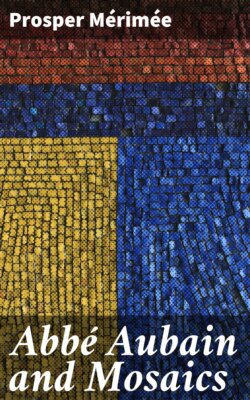Читать книгу Abbé Aubain and Mosaics - Prosper Merimee - Страница 8
На сайте Литреса книга снята с продажи.
LETTER IV.
ОглавлениеTable of Contents
The same to the same.
NOIRMOUTIERS, … February, 1845.
You must be burning to hear the story of that preciously preserved bouquet; but, the fact is, I dare not ask him about it. In the first place it is more than probable that there is no story underneath; then, if there is one, perhaps it would be a story which he did not like to talk about. As for me, I am quite convinced that … but come, don't let us tell fibs! You know that I cannot keep any secrets from you. I know this story, and I will tell it you in a few words; nothing easier. "How did it come about, Monsieur l'abbé," I said to him one day, "that with your brains and education you resigned yourself to the care of a little village?" He replied, with a sad smile: "It is easier to be the pastor of poor peasants than of townspeople. Everyone must cut his coat according to his cloth." "That is why," said I, "you ought to be in a better position." "I was once told," he went on, "that your uncle, the Bishop of N——, had deigned to notice me in order to offer me the cure of Sainte-Marie; it is the best in the diocese. My old aunt, who is my only surviving relative, and who lives at N——, said that it was a very desirable position for me. But I am all right here, and I learnt with pleasure that the bishop had made another choice. What does it matter to me? Am I not happy at Noirmoutiers? If I can do a little good here it is my place; I ought not to leave it. Besides, town life reminds me. … " He stopped, his eyes became sad and dreamy, then, recovering himself suddenly, he said, "We are not working at our botany. … " I could not think any longer of the litter of old hay on the table, and I continued my questions. "When did you take orders?" "Nine years ago." "Nine years … but surely you were then old enough to be established in a profession? I do not know, but I have always imagined it was not a youthful call which led you to the priesthood." "Alas! no," he said, in an ashamed manner; "but if my vocation came late, it was determined by causes … by a cause. … " He became embarrassed and could not finish. As for me, I plucked up courage. "I will wager," I said, "that a certain bouquet which I have seen had some part in that determination." Hardly had the impertinent question escaped me than I could have bitten out my tongue rather than have uttered such a thing, but it was too late. "Why, yes, Madam, that is true; I will tell you all about it, but not to-day—another time. The Angelus is about to ring." And he had left before the first stroke of the bell. I expected some terrible story. He came again the next day, and he himself took up the conversation of the previous day. He confessed to me that he had loved a young person of N——, but she had little fortune, and he, a student, had no other resources besides his wits. He said to her: "I am going to Paris, where I hope to obtain an opening; you will not forget me while I am working day and night to make myself worthy of you?" The young lady was sixteen or seventeen years old, and was very sentimental. She gave him her bouquet as a token of faith. A year after he heard of her marriage with the lawyer of N—— just when he had obtained a professorship in a college. He was overwhelmed by the blow, and renounced the chair. He told me that during these years he could not think of anything else, and he seemed as much moved whilst reciting this simple love story as though it had only just happened. Then he took the bouquet out of his pocket. "It was childish of me to keep it," he said, "perhaps even it was wrong," and he threw it on the fire. When the poor flowers had finished crackling and blazing, he went on in a calmer voice: "I am grateful to you for having asked me to tell this story. I have to thank you for making me part with a souvenir which it is scarcely suitable I should keep." But his heart was full, and it was easy to see how much the sacrifice had cost him. Poor priests! what a life is theirs! They must forbid themselves the most innocent thoughts, and must banish from their hearts every feeling which makes the happiness of other men … even those recollections which are a part of life itself. Priests remind us of ourselves, of all unfortunate women to whom every living feeling is forbidden as criminal. We are allowed to suffer, but even in that we must hide our pain. Good-bye, I reproach myself for my ill-advised curiosity, but it was indulged in on your behalf.
(We omit here several letters which do not contain any reference to the Abbé Aubain.)
